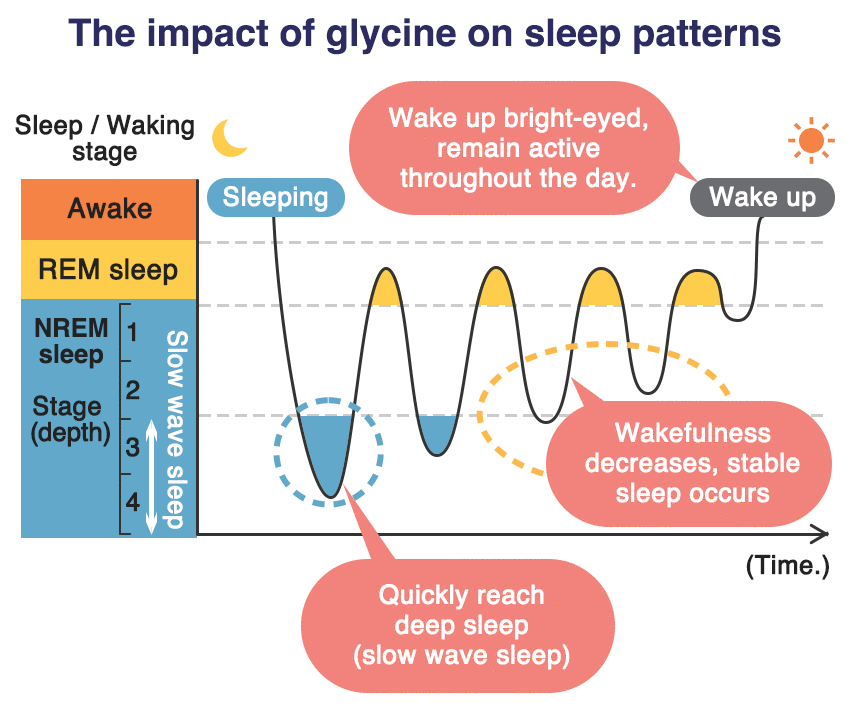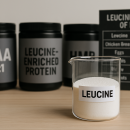In the intricate world of amino acid supplements, there are certain amino acids like Glutamine, Branched Chain Amino acids (BCAAs), and Citrulline that often garner all the attention. Meanwhile, others often fly under the radar, overshadowed by their more popular counterparts.
One such amino acid is glycine, which, although having a relatively lower profile, boasts several interesting properties.
When I started taking an interest in glycine a little over 10 years ago, I was a bit surprised at the lack of products on the market that contained glycine as part of multi-ingredient formulations. There were a couple of supplement brands that offered pure glycine in powder or capsule form but nothing more.
I am among the first supplement developers to use glycine in a variety of supplements intended for different purposes like relaxation, sleep, immunity, and gut health in conjunction with other synergistic ingredients.
This is because glycine is an amino acid with multiple virtues.
Glycine 101
I can still picture my Biology teacher Mr. Oodayechand Ramkhelawon drawing for the first time the structure of amino acids on the board.
Mr. Ramkhelawon used Glycine as an example to illustrate the structure of amino acids as Glycine is the “simplest amino acid” in terms of its structure.
From that day on I became fascinated with amino acid structure. I remember that I once grew frustrated in an accounting test and I drew the structure of glycine in the accounts test and handed it to Mr. Lowtoo, my accounts teacher. This earned me a big fat zero but it didn’t matter: I hated accounts and there are plenty of accountants and accounting softwares in the world but far fewer multidisciplinary nutritional product development scientists.
But I digress.
In addition to its structural simplicity, Glycine is classified as a non-essential amino acid because the body can manufacture it.
Simplest and non-essential: these were sufficient reasons for me to (wrongly) ignore Glycine until I joined University a couple of years later.
The truth is that glycine has multiple health benefits when consumed from protein foods and when taken in pure supplemental form. Supplementation can become important on states of higher physiological demand or specific disease conditions (e.g. during an infection).
Let us delve into the remarkable properties and benefits of this “simple and non-essential” amino acid.

Antioxidant Support
Glycine plays a pivotal role in the body’s antioxidant defense system.
This is because it functions as a vital component of the glutathione molecule.
By participating in the synthesis and regeneration of glutathione, glycine helps neutralise reactive oxygen species (ROS).
ROS are molecules that the body produces as part of its normal functioning. However, at times the production of ROS can outweigh the body’s ability to neutralise it and this is where problems happen.
Excessive ROS causes something called chronic oxidative stress which can contribute to the development of several diseases, including cardiovascular diseases, neurodegenerative disorders (like Alzheimer’s and Parkinson’s), cancer, diabetes, and aging-related conditions. It can also accelerate the aging process itself.
This is where antioxidants like glutathione comes into play. And Glycine is an important part of the production of glutathione.
This is the reason why I include Glycine (in gram quantities) in daily nutritional products like multivitamin formulas to ensure that the body is getting a steady supply of glycine.
Glutathione is also an important part of the immune system, helping in immune cell activation and the regulation of inflammation. Glycine is thus an important part of immune formulations that I develop.

Glycine as a precursor of the master antioxidant Glutathione (along with Glutamate and Cysteine). Source: Franco, R et al. (2007). The central role of glutathione in the pathophysiology of human diseases. Archives of Physiology and Biochemistry, 113(4-5), pp.234–258.
Collagen Synthesis
Collagen is vital for maintaining the structural integrity of various tissues, like skin, bones, tendons, and ligaments.
Glycine is an important part of collagen. It comprises one-third of the amino acid composition of collagen, contributes to the formation of the triple helix structure of collagen molecules.
By being involved in collagen synthesis, glycine promotes tissue strength, elasticity, and regeneration.
Supplementation with glycine may yield improvements in skin health, wound healing, and joint flexibility.
Relaxation and Sleep
Glycine serves as a neurotransmitter (chemicals that help transmit nerve signals) in the central nervous system, particularly in the spinal cord and brain.
Glycine is released by nerve cells and travels across a small gap called a synapse to reach another nerve cell.
Once it reaches the receiving cell, glycine binds to specific receptors on its surface, just like a key fitting into a lock.
This binding of glycine to its receptors has important effects on the receiving nerve cell: It can help to calm down the activity of the nerve cell and make it less likely to fire electrical signals.
Glycine also acts on NMDA receptors in the nervous system and regulate its activity. When NMDA receptors are overactive, the phenomenon of excitotoxicity can happen which can damage nerve cells.
In other words, it acts as a brake or inhibitory signal for the nerve cell.
This is very important when it comes to times when one needs to be in a state of relaxation, calmness and tranquility. That is why in formulations intended to achieve these effects, I use Glycine paired with synergistic ingredients like GABA that can accentuate the effects of glycine.
Clinical research also suggests that glycine supplementation can enhance sleep quality, reduce the time it takes to fall asleep (sleep onset latency), and increase sleep satisfaction.
These effects can be attributed to glycine’s ability to regulate circadian rhythm and enhance sleep quality, indirectly leading to improved cognitive function, mood stability, and daytime alertness.

The effect of glycine on sleep quality. Positive effects can be seen with the intake of 3g of glycine before bedtime. https://www.ajinomoto.com/amino-acids/sleep-and-amino-acids
Detoxification and Liver Health
Glycine plays a crucial role in several aspects of detoxification processes, predominantly within the liver.
It is involved in the conjugation of xenobiotics, facilitating their subsequent elimination from the body.
Xenobiotics are substances that are foreign to the body and are not naturally produced or expected to be present in the body. In simple terms, xenobiotics are things that are not supposed to be there, such as certain chemicals, drugs, pollutants, food additives or toxins that enter our bodies from external sources like the environment, food or medications.
One example of a xenobiotic is Benzoate, which is a preservative added to food to extend its shelf life. High intake of Benzoate is associated with asthma and ADHD in children.
Now, as a means for the body to get rid of benzoate it uses glycine to help in the conversion of benzoate into hippurate which is then excreted from the body. This type of reaction is called conjugation and it is very important reaction for the body to get rid of toxins that can affect its functioning.

The involvement of glycine in the metabolism of benzoate. Source: Williams, H.R.T.,et al. (2010). Differences in gut microbial metabolism are responsible for reduced hippurate synthesis in Crohn’s disease. BMC gastroenterology, [online] 10, p.108.
These mechanisms contribute to overall liver health and support the body’s ability to counteract the damaging effects of environmental toxins and pharmaceutical agents.
Glycine, Immunity and Gut health
Glycine plays a role in supporting immune function, although its precise mechanisms and effects on the immune system are still being studied.
Here are a few ways in which glycine is thought to be involved in immunity:
a. Improved Intestinal barrier function
The gut has a protective barrier formed by the intestinal lining, which prevents harmful substances and pathogens from entering the bloodstream.
Glycine has been suggested to help maintain the integrity and function of the intestinal barrier.
It may support the production of certain proteins that contribute to the tight junctions between intestinal cells, helping to strengthen the barrier and reduce the risk of unwanted substances crossing into the bloodstream.
b. Collagen production and tissue repair
As I wrote earlier, glycine is involved in collagen synthesis, which is essential for maintaining the structural integrity of tissues, including those involved in providing a first (physical) line of defence against invading pathogens like viruses.
Adequate collagen production is important for the proper maintenance of this physical barrier and by supporting collagen production, glycine may indirectly aid in the body’s defense against viral invasions.

Why take Glycine if the body can make it?
The body has a substantial demand for glycine due to its involvement in various biological processes.
While the body can produce glycine endogenously, the demand for this amino acid can often exceed the supply.
In certain situations, such as during periods of illness, stress, or high metabolic demands, the body’s need for glycine can rise even further, potentially surpassing the available supply.
In such cases, additional dietary sources or glycine supplementation may be necessary to meet the body’s demands and support optimal physiological functions.
Researchers have calculated the fluxes of glycine synthesis and its expenditure and found a deficit of glycine of about 10 g daily for a human of 70 kg body mass, even taking into account its regular intake from a common diet.
Therefore glycine must be considered to be an essential or indispensable amino acid because, although it can be synthesised by human metabolism, the body’s capacity for its synthesis does not satisfy the needs of the cells, especially for collagen synthesis.

https://www.sciencedirect.com/science/article/pii/S1756464620305429#t0005
Concluding remarks
Glycine’s multifaceted benefits are really intruguing and I take pride in being one of the first formulators to use this amino acid in diverse formulations, including daily multivitamin formulations, immune support formulations, sleep formulations and GABA-based formulations intended to promote relaxation and promote better sleep.
Glycine may be simple in structure and non-essential but definitely packs a powerful punch.

To view my Professional Profile on LinkedIn: please click here
To see my latest product creations: www.bioteenhealth.com
To view my Scientific Publications on PubMed: please click here
To get in touch, please write to: info@supplementscientist.com
Follow supplementscientist.com on Facebook: please click here
Medical disclaimer
The information presented on this website is intended for adults 18 or over. Its aim is purely educational and does not constitute medical advice. Please consult a medical or health professional before you begin any program related to exercise, nutrition, or supplementation especially if you have a medical condition. If you consume any product mentioned on our site, you do so on your own free will, and you knowingly and voluntarily accept the risks. © 2023. Supplementscientist.com







Leave a Reply